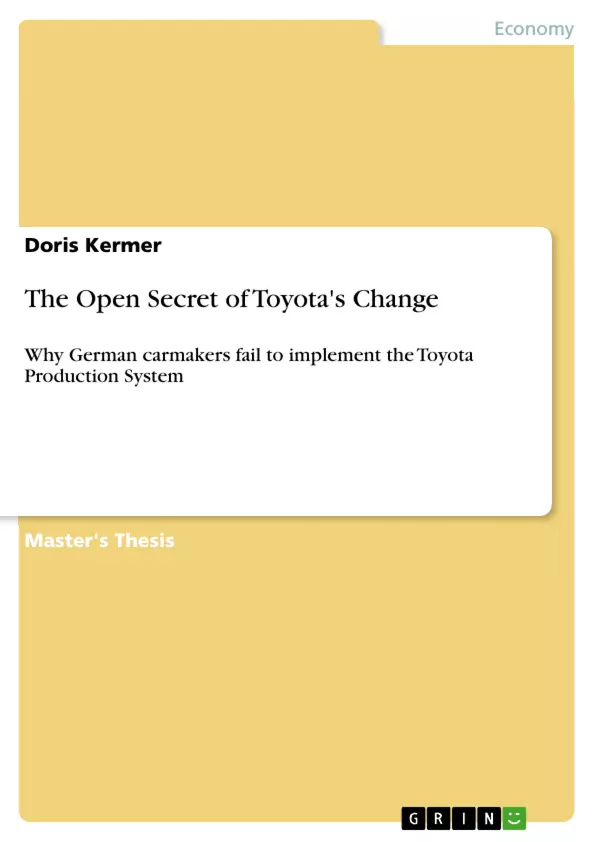This Master thesis explores the organisational change, as performed by Toyota after World War II which, within decades, made this company the most successful automobile producer in the world and a model of corporate governance.
Since the Toyota Production System (TPS) was born and continuously developed, it gave such a boost of productivity to the Japanese automobile industry that soon it was copied all over the world. The details of this system, which is to a huge amount based on practical experience and which requires a huge amount of preparatory work, are sufficiently known within the industry. Nevertheless, other Japanese companies and, in particular, international companies fail to catch up with Toyota. The question is, why?
Quite a number of car manufacturers already produce according to lean principles, as the TPS instruments are sometimes called, quite successfully, as it seems, and nevertheless they lag behind the performance of Toyota. A highly saturated North American and European automobile market requires thorough change, since companies, due to an increasing global competition, need to undergo some kind of change to survive in the market. Experts assume further consolidation among Original Equipment Manufacturers (OEM) until 2010.
Although everything seems to be known about TPS, there is obviously a remainder, because otherwise there would be more “Toyotas” than just one.
There must be something in TPS that has not been identified or has been left out so far by the majority of OEMs all over the world. (Judging from the current competition in the automotive industry, it is more likely that this ‘something’ has been unintentionally ignored). This is the case although the whole system, without any restrictions, is made accessible to competitors and anyone interested in TPS. Obviously, the knowledge of this mostly missing aspect or link in TPS is restricted, because in the current situation in the automotive industry no company can afford giving away any chances.
This master thesis aims at identifying and preparing the above mentioned, apparently hidden or unintentionally ignored, aspects of the Toyota Production System (TPS) which make Toyota more successful than other car makers.
Inhaltsverzeichnis (Table of Contents)
- Introduction
- Background
- Problem definition
- Objective
- Methodology
- Determination leads to longlasting success
- Preliminary results
- Directed backing information
- Utility analysis
- Results and Conclusion
- Outlook
Zielsetzung und Themenschwerpunkte (Objectives and Key Themes)
This master's thesis aims to investigate the success of Toyota's production system (TPS) and analyze why German car manufacturers struggle to implement it effectively. The study examines the fundamental principles of TPS, the challenges faced by German companies during implementation, and the critical factors contributing to Toyota's sustained success.
- The Toyota Production System (TPS)
- Implementation challenges faced by German car manufacturers
- Factors contributing to Toyota's success
- Comparison of production systems and methodologies
- The role of cultural differences and organizational structures
Zusammenfassung der Kapitel (Chapter Summaries)
- Introduction: This chapter provides a comprehensive overview of the study's background, problem definition, objective, methodology, and preliminary results. It establishes the context for the research and outlines the key questions to be explored.
- Results and Conclusion: This chapter presents the findings of the study, analyzing the data collected and drawing conclusions based on the research findings. It discusses the key factors that contribute to Toyota's success and the challenges faced by German car manufacturers.
- Outlook: This chapter provides a perspective on future research directions and potential applications of the findings. It explores potential solutions and strategies for German car manufacturers to improve their production systems and achieve long-lasting success.
Schlüsselwörter (Keywords)
This research focuses on key concepts such as the Toyota Production System (TPS), production efficiency, lean manufacturing, organizational culture, and the automotive industry. It examines the challenges and successes of implementing TPS in different contexts, particularly in the German automotive market. Core themes include cultural differences, management styles, and the importance of long-term vision for achieving sustainable success.
Frequently Asked Questions
What is the Toyota Production System (TPS)?
TPS is a socio-technical system developed by Toyota that focuses on eliminating waste, improving productivity, and fostering a culture of continuous improvement, often referred to as lean manufacturing.
Why do other car manufacturers struggle to replicate Toyota's success?
Research suggests that while the technical tools of TPS are well-known, many companies fail to adopt the underlying organizational culture, long-term vision, and management philosophy required for it to work effectively.
What are the key challenges for German car makers in implementing TPS?
Challenges include cultural differences, established organizational structures that resist change, and a focus on short-term results rather than the long-term process improvements inherent in TPS.
Is the knowledge of TPS kept secret by Toyota?
No, Toyota makes its system accessible to competitors. The "open secret" lies in the difficulty of implementing the intangible aspects, such as mindset and leadership styles.
What role does "Lean Manufacturing" play in the automotive industry?
Lean principles are essential for survival in highly saturated markets like Europe and North America, as they help companies remain competitive through efficiency and cost reduction.
- Arbeit zitieren
- M. A., MBA Doris Kermer (Autor:in), 2006, The Open Secret of Toyota's Change, München, GRIN Verlag, https://www.grin.com/document/83057



